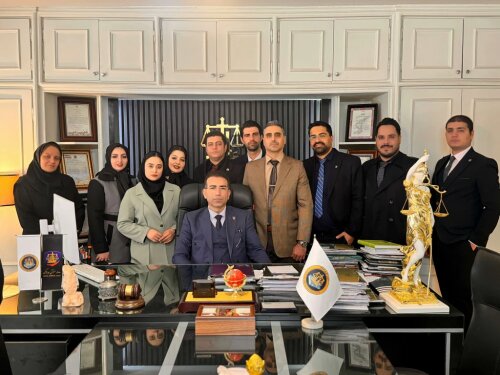Best Housing, Construction & Development Lawyers in Mashhad
Share your needs with us, get contacted by law firms.
Free. Takes 2 min.
Free Guide to Hiring a Real Estate Lawyer
List of the best lawyers in Mashhad, Iran
About Housing, Construction & Development Law in Mashhad, Iran
Housing, construction and development law in Mashhad covers legal regulations and frameworks affecting the construction, sale, ownership and management of residential and commercial properties. Mashhad, as one of Iran's largest cities and a major religious and economic hub, has seen rapid urban expansion. This growth comes with complex legal requirements related to property rights, land use, building codes and developer obligations. The legal landscape is shaped by national laws, local municipal ordinances and the unique needs of Mashhad’s population. Successful navigation of this sector requires understanding governmental permits, contract requirements, dispute resolution methods, and the compliance checks necessary to ensure developments are legal and safe for occupancy.
Why You May Need a Lawyer
Lawyers specializing in housing, construction and development are crucial in Mashhad for several reasons. If you are buying or selling property, an attorney ensures the transaction complies with local laws, helps draft or review contracts and assists with registration processes. Developers and builders need legal guidance when obtaining construction permits, complying with zoning laws, or securing project financing. If a conflict arises, such as contract disputes, boundary disagreements or issues with defective construction, legal counsel can help resolve these problems through negotiation, mediation or litigation. Landlords, tenants and homeowners’ associations also require advice to understand their rights and obligations under tenancy and housing regulations. In cases of expropriation or compulsory purchase by authorities for public development, a lawyer protects owners’ interests and negotiates fair compensation. Whether you are an investor, builder, homeowner or tenant, seeking legal advice ensures your rights are respected and obligations are clearly understood.
Local Laws Overview
In Mashhad, the framework for housing, construction and development is governed by both national law and city-specific regulations. The Iranian Civil Code addresses property rights, transfers, leases and inheritance. The Urban Land Act and the Regulations for Development and Construction define how land may be used, the types of buildings permitted in specific zones, and requirements for building permits. The Mashhad Municipality enforces building codes related to safety, environmental impact, architectural standards and utilities. All construction projects must obtain approvals and permits before work begins; violations can result in fines, stoppage orders or demolition. There are also rules governing property sales, the registration of deeds, dispute resolution mechanisms, and the division of apartment blocks according to the Horizontal Ownership Law. Developers must comply with financing regulations, buyer protection laws and standards for delivering completed units. Renters and landlords are subject to tenancy laws, which outline the rights and responsibilities on both sides. Finally, large development projects may be subject to additional environmental and urban planning assessments.
Frequently Asked Questions
What documents are necessary to buy or sell property in Mashhad?
You typically need a title deed, recent tax clearances, municipal certificates, and identification documents. A formal contract (beyan-nameh) is signed and eventually registered at the Notary Office.
How can I obtain a permit for construction or renovation?
You must apply to the Mashhad Municipality with architect plans, land ownership proof and identification. Approval from various departments, including zoning and environmental offices, is usually required before receiving a building permit.
What happens if I build without a permit?
Unauthorized construction may be fined, ordered demolished or refused connection to essential services. The municipality has the authority to inspect sites and take legal action against violators.
What are my rights as a tenant if my landlord wants to evict me?
Eviction can only occur in accordance with tenancy laws, typically after the lease expires or if contractual terms are violated. The landlord must obtain a court order to evict you legally.
How can real estate disputes be resolved?
Disputes can be settled through negotiation, mediation by local experts, or pursuing claims in specialized property or civil courts. A lawyer can advise on the best route and represent your interests.
Are there restrictions on foreigners owning property in Mashhad?
Foreign ownership is possible under Iranian law but subject to additional approvals and restrictions. Legal advice is highly recommended for foreigners interested in property transactions.
What should I do if I receive an expropriation notice from the government?
You should seek legal counsel immediately to review the notice, negotiate compensation, and ensure your rights are protected under expropriation and compensation laws.
What are common issues in construction contracts?
Delays in completion, payment disagreements, noncompliance with specifications, and quality defects are frequent issues. Detailed contracts with clear obligations and penalties help reduce risks.
How can developers ensure their projects are legally compliant?
Developers must secure all necessary permits, adhere to approved plans, follow building codes, and ensure timely registration of units. Legal counsel can review project documentation to confirm compliance.
What are the local authorities involved in property and development matters?
Key bodies include the Mashhad Municipality, Land Registration Organization, Urban Planning Authority, and Iranian Notary Public Offices. These entities handle permits, registrations, approvals and official certifications.
Additional Resources
- Mashhad Municipality (Shahrdari Mashhad): Handles construction permits, compliance and urban planning issues - Iranian Land Registration Organization (Sazman Sabt Asnad va Amlak): Oversees land and property records, title deeds and registration - Mashhad Urban Development and Planning Office: Provides guidelines and zoning information for new developments - Ministry of Roads and Urban Development: National-level authority responsible for housing policies and regulations - Bar Association of Mashhad: Directory of qualified lawyers specializing in property, construction and tenancy law - Dispute Resolution Councils: Community-level bodies that may help resolve minor property disputes
Next Steps
If you need legal assistance in housing, construction or development matters in Mashhad, start by gathering all related documents, including contracts, permits and correspondence. List your specific concerns and goals before contacting a legal professional. Search for experienced lawyers or law firms specializing in real estate and construction law, or consult with the local bar association for referrals. Initial consultations are helpful for understanding your position and options. If your case involves government approvals or disputes, engaging a legal expert early can prevent costly mistakes and delays. Stay informed by utilizing recommended resources and always ensure that any agreement or transaction is formalized in writing and duly registered with the relevant authorities.
Lawzana helps you find the best lawyers and law firms in Mashhad through a curated and pre-screened list of qualified legal professionals. Our platform offers rankings and detailed profiles of attorneys and law firms, allowing you to compare based on practice areas, including Housing, Construction & Development, experience, and client feedback.
Each profile includes a description of the firm's areas of practice, client reviews, team members and partners, year of establishment, spoken languages, office locations, contact information, social media presence, and any published articles or resources. Most firms on our platform speak English and are experienced in both local and international legal matters.
Get a quote from top-rated law firms in Mashhad, Iran — quickly, securely, and without unnecessary hassle.
Disclaimer:
The information provided on this page is for general informational purposes only and does not constitute legal advice. While we strive to ensure the accuracy and relevance of the content, legal information may change over time, and interpretations of the law can vary. You should always consult with a qualified legal professional for advice specific to your situation.
We disclaim all liability for actions taken or not taken based on the content of this page. If you believe any information is incorrect or outdated, please contact us, and we will review and update it where appropriate.










